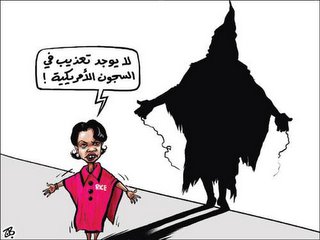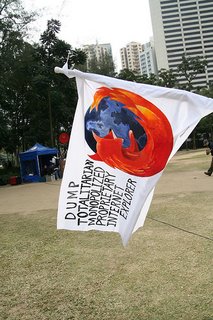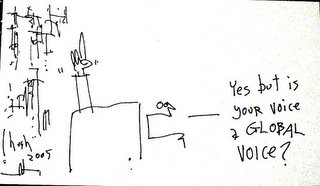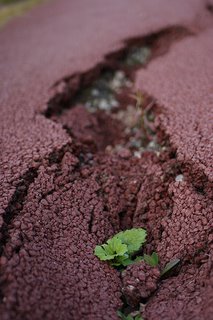You can't eat sovereignty
"I was in a gathering of about 10 civic groups the other day and amongst other statements one person commented, “the system is irretrievably virused”. In plain speak, Zimbabwe is fucked. Curious though that even with this very clear and creative description of where we’re at there is very little energy spent reviewing the tactics that civic and human rights activists are using in challenging repression. Clearly, we need to change what we’re doing because we’re not having much impact.
But then again it’s also really important to look around and check out what forms of direct action are taking place. Everywhere I look these days when I’m on the move in Harare, I see widespread guerilla gardening. Urban agriculture is pretty much illegal and often guerilla gardeners have their crops slashed – most cruelly when they are hip high and almost ready to harvest. But despite this threat urban dwellers have gone all out and are using every available patch of land to grow food for their families. Perhaps they don’t see any hope in uprooting our dictator but that won’t stop them trying to feed themselves." [link]
An African student was stabbed to death and another seriously wounded in St Petersburg over the Christmas weekend, raising fears that hate crimes are spreading across Russia. A Cameroonian student was killed just hours after another two Africans were slashed with a knife on the same street. All three victims were members of St Petersburg's Water Transport University, where many foreigners study and live together in dormitories. Many are now terrified to go out onto the streets of St Petersburg.
Other news from Russia yesterday came from Moscow: about an explosion, or a fire in the city.
Terrorism was immediately excluded, because it had to do with commercial 'competitors', or well, that was the used desription. (by a 24-hours-news-TV)
I wonder what happened with the word mafia, or how about Russian organized crime? That would be a more appropriate definition for what is exploding in Russia.
The growth in Iranian blogging is part of a worldwide surge.
In 1999, there were some 50 bloggers on the web; in January there were about 5.4 million; today, according to the blog search engine Technorati, there are more than 23 million.
There are reasons why Iran should be especially fertile ground for blogging. More than 90 per cent of the country is literate, and 70 per cent of the country’s citizens are under 30. Computer ownership is relatively high and internet cafés abound. The first Iranian blog was born in November 2001, when Hossein Derakhshan, an Iranian journalist, posted instructions on how to build a simple weblog in under ten minutes. As Nasrin Alavi (a pseudonym) demonstrates in her new book, We Are Iran: the Persian Blogs, these diary sites cover the gamut: angry, sad, humorous and brave. Like all blogs they can also be self-indulgent, inaccurate, inarticulate and boring. Internet usage is growing faster in Iran than anywhere in the Muslim Middle East, and there are now more blogs in Farsi than in German, Italian, Spanish, Russian or Chinese. Apparently, since the rise of the blogs, graffiti have almost entirely vanished from the walls of Tehran’s public toilets.
With almost all Iran’s reformist newspapers closed down and many editors imprisoned, blogs offer an opportunity for dissent, discussion and dissemination of ideas that is not available in any other forum. There is wistful yearning in many Iranian blogs, and a persistent vein of anger: “I keep a weblog so that I can breath in this suffocating air,” writes one blogger. “I write so as not be lost in despair.” Blogs by Muslim women are particularly moving in their bitter portrayal of life behind the veil. [..]
By way of Kisses&Roses -> The DARFUR-blog
 WASHINGTON, DC - With 2005 drawing to a close, the White House held a special ceremony in the East Room Saturday to commemorate its fifth year without any sort of oral-genital contact within its historic confines. "This administration has upheld its promise to restore dignity to the White House," President Bush said. [..]
WASHINGTON, DC - With 2005 drawing to a close, the White House held a special ceremony in the East Room Saturday to commemorate its fifth year without any sort of oral-genital contact within its historic confines. "This administration has upheld its promise to restore dignity to the White House," President Bush said. [..]Sabbah's: "... But that’s not all. Here is more horrifying news to cheer-up the warmonger. This time with, lovers of sonic booms. Four Palestinians die due to sound-bombs and shelling in Gaza Strip:
Some 77 people, especially children and elderly women, rushed to the hospital after the attack, suffering from nausea and confusion, some of whom were transferred to a specialist care centre for treatment of the nervous system. Some of the more serious cases involved internal bleeding in the brain and five pregnant women lost their babies as a direct result of the sound-bomb attack - a new Israeli tactic known to traumatize and induce miscarriages.
Colin Powell, the former US Secretary of State, said that statements of ignorance by European leaders such Jack Straw about the transport, detention and torture of suspects were not believable.
Colin Powell accepted that allegations over rendition can damage a country's global image. "The United States is going through a period right now where public opinion world-wide is against us."I think that's a function of some of the policies we have followed in recent years with respect to Iraq and in not solving the Middle East's problem, and perhaps the way in which we have communicated our views to the rest of the world. We have created an impression that we are unilateralist, we don't care what the rest of the world thinks. I don't think that's a fair impression."
Article in The Independent
and more: Iraq on the Record
 A lot of talking about IP-control lately. And Yahoo, Google, China, Cisco, Zimbabwe - webfiltering and so on and so forth. Must be a lot of commercial profits in it. Could there possibly be other reasons?
A lot of talking about IP-control lately. And Yahoo, Google, China, Cisco, Zimbabwe - webfiltering and so on and so forth. Must be a lot of commercial profits in it. Could there possibly be other reasons? There (at GNN'shift) some tips for Anonymous Web Browsing
Violence and the Political Requirements of the Global Drug Traffic - By Peter Dale Scott (18,734 words)
In the last three decades, three important facts have emerged about the international drug traffic. The first is that it is both huge and growing.
Narcotics are estimated to be worth between $500 billion and $1 trillion a year, an amount, according to UN Secretary General Kofi Annan in remarks to a United Nations General Assembly session in June 2003, that is greater than the global oil and gas industry, and twice as large as the overall automobile industry.[2]
The second is that it is both worldwide and above all "highly integrated."[3] At global drug summits such as the one in Armenia in 1993, representatives of the Sicilian Mafia, the
[..]
One piece of evidence for this consists in a meeting which took place in July 1999 in southern France near Nice, at the villa in Beaulieu of Adnan Khashoggi, once called "the richest man in the world." Those at the meeting included a member of the Yeltsin cabal in the Kremlin and four representatives from the meta-group, with passports from Venezuela, Turkey, United Arab Emirates and Germany. Between them they allegedly enjoyed excellent relations with:
1) Ayman al-Zawahiri, the acknowledged mastermind of 9/11 and senior mentor to Osama bin Laden.
2) Soviet military intelligence.
3) the FARC, the Colombian revolutionary group that has become increasingly involved in the drug traffic.
4) the Kosovo Liberation Army, a similarly involved group.
5) (according to a well-informed Russian source) the CIA.
Harare - Radio Voice of the People has been raided by the police on the afternoon of the 15th december. According to local sources they were looking for the station manager, John Masuku and radio journalist Shorai Kwai, who were not in the office at the time of the raiding. At the time of this news alert there were no arrests, but the equipment of radio VOP had been sealed off and the staff had to remain in their office, nobody being allowed in or out. Zimbabwe Lawyers for Human Rights had been allerted and were at the office for legal protection of Radio VOP.
Please forward this news alert!
see GNN-blog on this as well...
And IRIN - ZIMBABWE: Police raid independent radio station
(Am starting to feel like a media enterprise myself, apart from some financial differences)
 The cartoon reads: "There is no torture in American prisons"
The cartoon reads: "There is no torture in American prisons"originally found here in the online edition of the Jordanian paper Al-Ghad
By Fernando Kallás for the Lebanese Blogger Forum
"A bare-chested youth in Quicksilver boardshorts tore the headscarf off the girl's head as she slithered down the Cronulla dune seeking safety on the beach from a thousand-strong baying mob.
Up on the road, Marcus "Carcass" Butcher, 28, a builder from Penrith, wearing workboots, war-camouflage shorts and black singlet bearing the words "Mahommid was a camel f---ing faggot" raised both arms to the sky. "F--- off, Leb," he cried victoriously." (The Sydney Morning Herald - December 12th 2005)
First of all, I would like to warn about the strong and shocking images that follows this article. But I think they're necessary under the circumstances.
I'm really sorry also that my first post in the Leb Blogger Forum has to be about such sickening, shameful and outrageous events that are happening in Australian in the last couple of days.
It all started as a beach party in Cronulla - Sydney, celebrating a kind of perverted nationalism that was gatecrashed by racism. [article]
 Welcome to Curbside @WTO, a website aimed at providing a unique frontline perspective on the WTO meetings being held in Hong Kong from Dec.13-18th.
Welcome to Curbside @WTO, a website aimed at providing a unique frontline perspective on the WTO meetings being held in Hong Kong from Dec.13-18th.Curbside combines blogs and feature stories contributed by journalism students from the University of Hong Kong, journalists from The Standard newspaper and ESWN's blogger, Roland Soong. Curbside's goal is not only to inform and entertain readers on the events surrounding the WTO, but also to explore the potential of online journalism.
 Reuters, BBC, The Guardian, AP etc. Big media corporations all look in the direction of bloggers.
Reuters, BBC, The Guardian, AP etc. Big media corporations all look in the direction of bloggers.At the Global Voices Summit it was said that a blog is a 'good blog' when it's passionate.
How do bloggers survive though?
And what is a definition for 'good media'?
How does good media survive?
Global Voices Summit - Live Blog
This i read in the article 'System v. the System' about MTV and Fuse, and a GNN editor being stunned: "A Fuse executive told me that the network declined to play the (SOAD) video because the U.S. Army was a major sponsor of the channel – the people in ad sales didn’t want to piss off the generals."
Contemporaneously to Saddam Hussein's trial in Baghdad, a trial is taking place in The Netherlands against Frans van Anraat. Witnesses in this trial are survivors and victims from the poison gass attacks in Kurdish Halabja. Van Anraat lived under SH's protection in Baghdad, through the sanctions (that didn't affect these 'huns'). Van Anraat claims to be a business man, or well that is the term which with his profession is indicated through the news. His business consisted of providing the substances for the poison gas.
Wanted by the FBI - Date: 25 May 2000:
Frans Cornelis Adrianus Van Anraat is a citizen of the Netherlands, born in Den Helder on August 9, 1942. He is a white male, 178 centimeters in height, and has graying hair. He wears eyeglasses and may have a full beard. He speaks Dutch, Italian, and English. He has visited Switzerland, Italy, and the Netherlands in recent years. He is now in Baghdad, Iraq.
CASE DETAILS: Soldiers in the First World War called mustard gas "the Devil's breath." It is one of the most terrible weapons ever devised. It can leave its victims blind and covered with agonizing blisters. Inhaled, mustard gas can cause a slow, painful death by suffocation. For decades, its use has been banned by international conventions. But illegal trafficking in mustard gas and other deadly chemical weapons continues. Two of the profiteers of this illicit trade are international fugitives.
Between October, 1987, and April, 1988, Frans Van Anraat and Peter Walaschek arranged for the illegal export of the chemical thiodiglycol from the United States. Thiodiglycol is a chemical used in the production of mustard gas. On January 26, 1989, Van Anraat was arrested by Italian authorities at the request of the U.S. government. Six months later, an Italian court rejected a U.S. extradition request. In February, 1990, the Italian Supreme Court overturned that decision and ordered Van Anraat's extradition, but he had already fled Italian jurisdiction.
Peter Walaschek was arrested in the United States in July, 1988, He pleaded guilty to violating U.S. export laws. But prior to his sentencing he escaped to Germany in December, 1988.
If you have any information concerning Frans Van Anraat or Peter Walaschek, you should contact the nearest U. S. embassy or consulate. The U. S. guarantees that all reports will be investigated and all information will be kept confidential. The U.S. may pay a reward for information that leads to the arrest of these fugitives.
From: FBICrimeType: Murder
By LILA RAJIVA at CounterPunch
"... Again, note. The CIA held these prisoners in contravention of the laws even of the torturing countries. Even Egypt, Syria or Jordan have legal systems - however harsh - that would have necessitated charges and a legal defense. But as ex-FBI agent Dan Coleman has stated, "We're taking people, and keeping them in our own custody [my emphasis] in third countries. That's an enormous problem....There was a process there [in Egypt]," Coleman says. "But what's our process? We have no method over there other than our laws"and we've decided to ignore them. What are we now, the Huns? If you don't talk to us, we'll kill you?" (7) [..]
Reporters Without Borders today published four Letters to a young African who wants to be a journalist to coincide with a two-day Africa-France summit dedicated to young people that starts tomorrow in the Malian capital of Bamako. The letters were written by veteran journalists from Cameroon, the Democratic Republic of Congo, Nigeria and Zimbabwe.
“These four personal accounts are instructive, showing us how African journalists do honour to a dangerous profession despite oppression, poverty and indifference,” the press freedom organisation said. “Independent journalists are vital for people and nations. If France really wants to help Africa, it should defend its freedom. And if Africa’s leaders want to defend the interests of their peoples, they should be proud that a vigorous and responsible press is free to criticise them without risking prison or death.”
African teenagers dream of being journalists, the authors of the four letters say. “Just for fun, I used to play at being a reporter during the school championships,” writes Donat M’Baya Tshimanga of the Democratic Republic of Congo, who heads an Congolese organisation called Journalist in Danger (JED).
Journalists often serve as models, like star soccer players or film actors. Guthrie Munyuki of Zimbabwe’s Daily News says he could not decide whether to be a lawyer, journalist or soccer player. “I saw myself as the next Mike Munyati, the late journalist for the Zimbabwe Broadcasting Corporation, and Michel Platini, the former mercurial French footballer.” [..]
 Blogging withs SMS messages could be a good option for areas with bad connectivity. First experiences with this can be found at the SMS Quake Blog:
Blogging withs SMS messages could be a good option for areas with bad connectivity. First experiences with this can be found at the SMS Quake Blog:SMS reports from the Pakistan EarthQuake disaster scene by members of the QuakeHelp blog and friends.
Background Several founders and members of the SEA EAT (South East Asian Earthquake And Tsunami) blog & wiki, which gained worldwide attention at the time of the earthquake and tsunami on 26th December, 2004, have remobilised to aid in the relief efforts after the South Asian Quake of 8th October.


